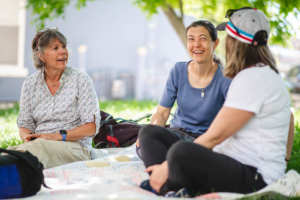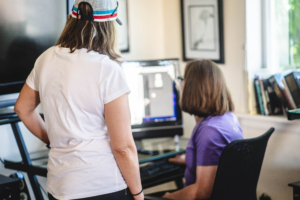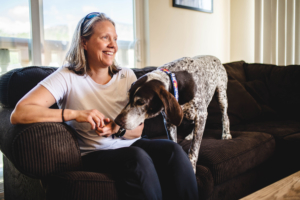Transitional Living Program
We are accepting directly at the transitional level for those who may have attended another program but are interested in support while living more independently.
Finding stable housing for clients is an important aspect of the treatment model pioneered by the late Colorado Recovery founder Richard Warner. We offer a Transitional Living Program to our patients with a mental health diagnosis such as schizophrenia, bipolar disorder, and schizoaffective disorder who are progressing from 24 hour residential care to a more independent living environment with minimal supervision.
The program includes:
- Support groups
- Vocational services
- Idividualized life skills
- Social and recreational opportunities
- Clinical services
- Room and funds to buy groceries to prepare meals
- A safe and healthy living environment
- Oversight by live-in therapeutic housemates
- Shopping, cooking, and dining as a group
- Learning how to manage an independent household
- Weekly house meetings
- Life skills coaching
- Individual therapy sessions
- Vocational counseling
- Recreational, therapeutic and psychoeducational groups
- Fully furnished townhomes
Comprehensive Assessment
Key to direct admission is a careful assessment of the new client by the outpatient team that typically takes several days. It is important to make sure that clients are ready for a transitional living environment in an unlocked, co-ed facility. It’s also important to remember that transitional living at Colorado Recovery means sober living.
Referring to our Transitional Living ProgrammingTo make a referral, clinicians or clients may call our Admissions team at 720-218-4068. Fees Our Transitional Living Program is currently a private pay service. Please call for additional information. |
SIX STAGES TO INDEPENDANCE
1. Orientation
Clients identify their strengths and areas they want to work on as they are getting comfortable with independent transportation, time management, food shopping, preparing meals, and other life skills.
2. Community
Clients engage with their transitional living peers and the wider community. They begin to help with meetings and meals for the transitional living program and start exploring activities and groups outside the program. Here, they are spend time with life skills coaches and vocational trainers.
3. Goal Setting
After working toward employment, volunteering, or continuing education, it’s now time to focus on some short and long-term goals. Here, clients get to check in with their treatment team to discuss the best options for moving forward. They can also rely on Colorado Recovery’s local community partners to help make those goals a reality.
4. Reenforcing Routine
The fourth stage is all about maintaining a routine surrounding all of the healthy habits clients are learning. This helps increase structure and stability as they continue to progress.
5. Reflection
The fifth stage allows clients time to reflect on how far they have come and where they are headed as they prepare to leave the Transitional Living Program. This is an important time of acknowledgement of the equity they have built in themselves and gives the confidence for the final stage of their time here.
6. Transition
In the final stage, clients work through logistical preparation while they enjoy lots of access to support. They work on packing, making purchases, and organizing their new home. They are now well prepared for success!






